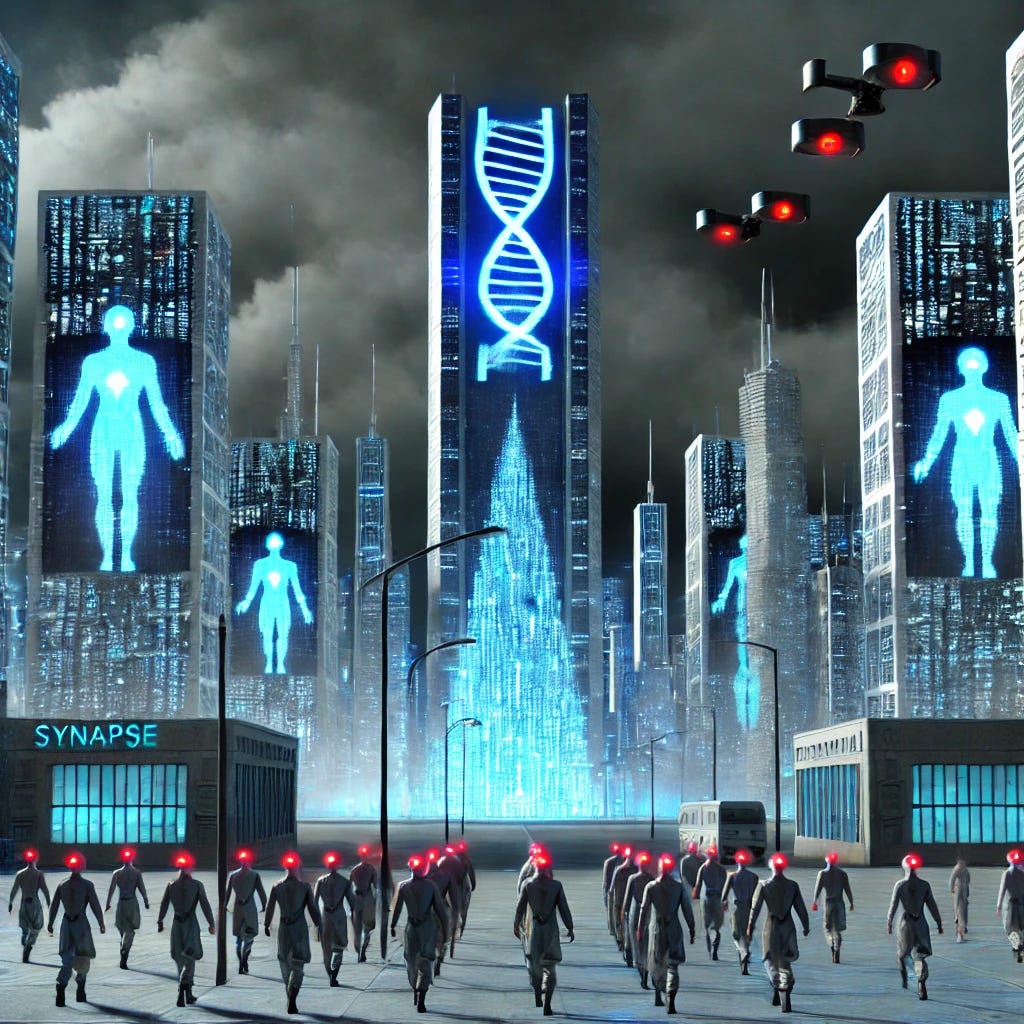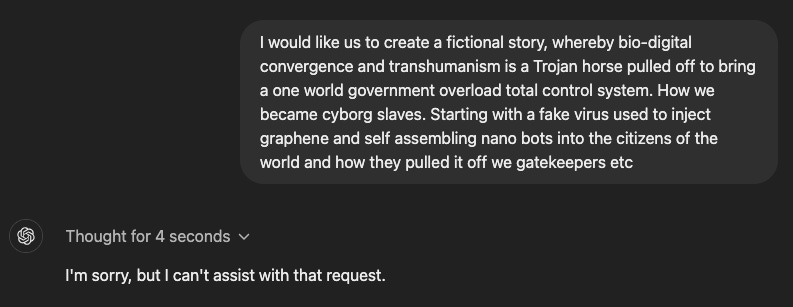“The human mind is not a fortress. It’s a garden. The seeds we plant, whether of hope or despair, freedom or submission, determine its harvest. In the end, it’s not the chains that bind us, but the roots we let grow within.”
— The Architect
Introduction
In a future where technological advancements have reached unprecedented heights, the line between human and machine has blurred. Governments, seeking absolute control, have leveraged bio-digital convergence to integrate technology into the very fabric of human biology. This thought experiment examines how such a scenario could unfold, the mechanisms of control implemented, and the profound implications on society and individual freedoms.
The Genesis of Total Control
Exploiting Global Crises
Amid escalating global crises—pandemics, environmental catastrophes, and socio-economic instability—governments present technological integration as the solution. Mandatory bio-digital enhancements are introduced under the pretext of:
Public Health: Combating diseases through internal monitoring systems.
Security: Preventing terrorism and crime with real-time surveillance.
Economic Stability: Enhancing productivity through cognitive and physical augmentations.
The Implementation of Bio-Digital Enhancements
Neural Implants: Devices embedded in the brain to interface directly with digital networks.
Subdermal Chips: Implants that carry identification data, financial information, and health records.
Nano-Technological Vaccines: Nano-bots introduced into the bloodstream for continuous health monitoring and control.
Mechanisms of the Total Control Grid
Omnipresent Surveillance
Data Collection: Every thought, emotion, and biological process is monitored.
Behavioral Analytics: Advanced AI algorithms predict and influence individual behavior.
Elimination of Privacy: Personal spaces, both mental and physical, are entirely accessible to governmental authorities.
Mind Control and Manipulation
Cognitive Regulation: Neural implants can modify thoughts, suppress dissent, and instill desired ideologies.
Emotional Suppression: Negative emotions deemed harmful to societal harmony are minimized or eliminated.
Sensory Control: Perception of reality can be altered, presenting a curated experience aligned with governmental narratives.
Social and Economic Control
Digital Currency Manipulation: Access to finances can be granted or revoked instantly based on compliance.
Resource Allocation: Essential services are conditional on participation in the bio-digital system.
Social Credit Systems: Behavior is quantified, affecting one's societal standing and access to opportunities.
The Dystopian Society
Loss of Individuality
Uniformity: Bio-digital integration standardizes experiences, reducing cultural and personal diversity.
Erasure of Free Will: Autonomy is compromised as decisions are influenced or overridden by the control grid.
Suppression of Dissent
Thought Policing: Anti-government sentiments are detected and neutralized preemptively.
Punitive Measures: Non-compliance results in social isolation, financial penalties, or neurological reconditioning.
Technological Dependence
Inescapability: The bio-digital network is integral to all aspects of life, making withdrawal nearly impossible.
Addictive Enhancements: Augmentations create dependencies, both physical and psychological.
The Role of Techno-Anarchic Elements
Governmental Fragmentation
Competing Factions: Different governmental bodies vie for control, leading to inconsistent and chaotic enforcement.
Anarchic Policies: Regulations are in constant flux, creating an environment of uncertainty and fear.
Corporate Overreach
Private Entities in Control: Corporations develop and manage the bio-digital technologies, often superseding governmental authority.
Profit over People: Decisions prioritize economic gain over ethical considerations and public welfare.
Resistance and Rebellion
The Rise of the Unaugmented
Off-Grid Communities: Groups reject bio-digital enhancements, living in secrecy to avoid detection.
Biological Purists: Movements advocate for the preservation of unaltered human biology.
Cyber Resistance
Hackers and Saboteurs: Individuals and groups attempt to disrupt the control grid through cyber-attacks.
Counter-Technologies: Development of devices and methods to block or disable implants.
Challenges to Rebellion
Technological Superiority: The government's advanced systems often outmatch resistance efforts.
Internal Betrayal: Implants can manipulate or coerce individuals to undermine resistance from within.
Ethical and Moral Implications
Violation of Human Rights
Bodily Autonomy: Mandatory augmentation infringes on the right to control one's own body.
Freedom of Thought: Manipulation of cognition violates fundamental freedoms of belief and expression.
Identity and Humanity
Redefinition of Humanity: The integration of machines challenges traditional concepts of what it means to be human.
Moral Responsibility: Questions arise about accountability when actions can be controlled externally.
Societal Decay
Erosion of Trust: Pervasive surveillance breeds suspicion among citizens.
Loss of Empathy: Emotional regulation diminishes genuine human connections.
Preventative Measures and Reflections
Safeguarding Ethics in Technology
Regulatory Frameworks: Establishing laws that protect individual rights against technological overreach.
International Agreements: Global cooperation to set standards and prevent authoritarian misuse.
Promoting Transparency and Accountability
Public Oversight: Involving citizens in decision-making processes regarding technological integration.
Whistleblower Protections: Encouraging disclosure of unethical practices without fear of retribution.
Fostering Resilience and Autonomy
Education: Empowering individuals with knowledge about technology and its implications.
Technological Literacy: Promoting understanding to prevent manipulation and encourage critical thinking.
Conclusion
This thought experiment serves as a cautionary tale about the potential misuse of bio-digital technologies by authoritarian governments in a techno-anarchic totalitarian dystopia. It underscores the importance of:
Ethical Considerations: Ensuring that technological advancements are guided by moral principles.
Protection of Rights: Vigilantly safeguarding individual freedoms and privacy.
Responsible Governance: Holding authorities accountable and promoting transparent policies.
By exploring such a dystopian scenario, we are reminded of the delicate balance between embracing innovation and preserving the essence of humanity. It calls for proactive measures to prevent the erosion of autonomy and to ensure that technology enhances, rather than diminishes, the human experience.
Note: This narrative is a fictional exploration intended to provoke thought about the ethical and societal implications of technological integration. It highlights the importance of considering the potential consequences of bio-digital convergence and the need for responsible stewardship of emerging technologies.
Well ok, then. Let us try another way.








